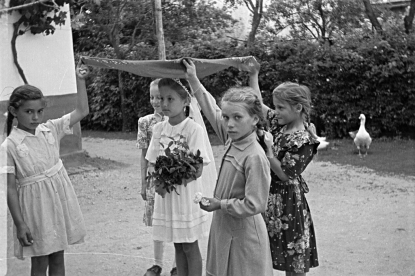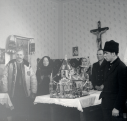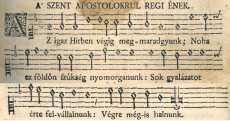2024. April 27. Saturday
The House of Hungary - Budapest
|
|
Address: 1014, Budapest Zrínyi u. 5.
Phone number: (1) 795-2620
E-mail: info@bgazrt.hu
Opening hours: Tue-Sun 9-18
|
The exhibition has closed for visitors.
2016.01.15. - 2016.03.20.
Museum tickets, service costs:
|
Individual ticket for adults
|
1000 HUF
|
|
|
Individual ticket for adults
|
200 HUF
|
|
|
Group ticket for adults
(min. 15 poeple)
|
800 HUF
|
/ capita
|
|
Individual ticket for students
|
500 HUF
|
|
|
Individual ticket for students
|
200 HUF
|
|
|
Group ticket for students
(min. 15 people)
|
400 HUF
|
/ capita
|
|
Individual ticket for pensioners
|
500 HUF
|
|
|
Group ticket for pensioners
(min. 15 people)
|
400 HUF
|
/ capita
|
|
Ticket for families
(max. 2 adults + 3 children)
|
1800 HUF
|
/ family
|
|
Group guide
(max. 25 people)
|
5000 HUF
|
/ group
|
|
Group guide
(over 25 people)
|
200 HUF
|
/ capita
|
|
Group guide
(max. 25 people)
|
8000 HUF
|
/ group
|
|
Group guide
(over 25 people)
|
200 HUF
|
/ capita
|
László Lajtha was a Kossuth-Prize-winning composer and folk music researcher, whose name is uttered with those of Bartók and Kodály as one of the three “great Hungarians”. This title was earned in view not only of his career, but also of the tireless work all three men undertook in collecting and evaluating all they could of the great wealth of Hungarian folk music.

Though Lajtha studied music in Budapest, Leipzig, and Geneva, he was most heavily influenced by his time in Paris, where he lived from 1910 until 1914. In acquiescence to his parents’ wishes, he studied law alongside his career in music, earning him the degree that would permit him use of the doctor’s title.
His first folk music fieldwork tour was undertaken in 1911 at the prompting of Béla Bartók, with whom he was to work for many years. The friendship that developed between the two men is witnessed by their many letters.
In 1913, having received his diploma in musical composition, he obtained a position with the Wax cylinder and Musical Instrument Collection of the National Museum. He maintained a relationship with the Museum of Ethnography until his death, even serving as museum director for a brief period between August and December of 1946.
In 1919, Lajtha taught at the National Institute of Higher Music, where he would serve as director from 1945 until 1949.
His work in ecclesiastical music can be linked primarily to the Kálvin Square Hungarian Reformed Church, where he directed choir until the end of the 1920s. During the first half of the 1940s, he also held concerts at the Szabadság Square Hungarian Reformed church with an orchestra of his own founding.
It was Lajtha who reorganised the orchestra of the Hungarian Radio, where he served as director in 1945, expanding it to the size of a full symphonic orchestra.
In 1947 and 1948, he lived in Paris and London, where he took part in the founding of the International Folk Council, of which he would also become a board member.
Lajtha did fieldwork in numerous places in Hungary, producing recordings of both vocal and instrumental music. Working first with phonograph cylinders, then with audio tape, Lajtha was one of the scholars at the Hungarian Radio who directed the Pátria recording project.
In 1951, the People’s Republic of Hungary awarded Lajtha the Kossuth Prize; in 1955, he became the first Hungarian artist to be elected member of the Accadémie des Beaux Arts in Paris. Lajtha’s international reputation was sealed when he received the Coolidge Prize for his Third String Quartet in 1929. He was a prolific composer, writing 9 symphonies, 10 string quartets, a ballet, an opera, and numerous works of chamber music.
The multi-lingual cultural diplomat continued his folk music fieldwork until the end of his life, donating not only recordings, but also a number of artefacts to the Museum of Ethnography.

Though Lajtha studied music in Budapest, Leipzig, and Geneva, he was most heavily influenced by his time in Paris, where he lived from 1910 until 1914. In acquiescence to his parents’ wishes, he studied law alongside his career in music, earning him the degree that would permit him use of the doctor’s title.
His first folk music fieldwork tour was undertaken in 1911 at the prompting of Béla Bartók, with whom he was to work for many years. The friendship that developed between the two men is witnessed by their many letters.
In 1913, having received his diploma in musical composition, he obtained a position with the Wax cylinder and Musical Instrument Collection of the National Museum. He maintained a relationship with the Museum of Ethnography until his death, even serving as museum director for a brief period between August and December of 1946.
In 1919, Lajtha taught at the National Institute of Higher Music, where he would serve as director from 1945 until 1949.
His work in ecclesiastical music can be linked primarily to the Kálvin Square Hungarian Reformed Church, where he directed choir until the end of the 1920s. During the first half of the 1940s, he also held concerts at the Szabadság Square Hungarian Reformed church with an orchestra of his own founding.
It was Lajtha who reorganised the orchestra of the Hungarian Radio, where he served as director in 1945, expanding it to the size of a full symphonic orchestra.
In 1947 and 1948, he lived in Paris and London, where he took part in the founding of the International Folk Council, of which he would also become a board member.
Lajtha did fieldwork in numerous places in Hungary, producing recordings of both vocal and instrumental music. Working first with phonograph cylinders, then with audio tape, Lajtha was one of the scholars at the Hungarian Radio who directed the Pátria recording project.
In 1951, the People’s Republic of Hungary awarded Lajtha the Kossuth Prize; in 1955, he became the first Hungarian artist to be elected member of the Accadémie des Beaux Arts in Paris. Lajtha’s international reputation was sealed when he received the Coolidge Prize for his Third String Quartet in 1929. He was a prolific composer, writing 9 symphonies, 10 string quartets, a ballet, an opera, and numerous works of chamber music.
The multi-lingual cultural diplomat continued his folk music fieldwork until the end of his life, donating not only recordings, but also a number of artefacts to the Museum of Ethnography.




